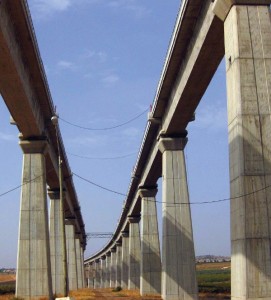While Israel's planned fast train that connects Tel Aviv to Jerusalem in a quick 28 minutes will be welcomed by weary commuters, it spells further land confiscation from villages bordering the ever-irrelevant Green Line.
The website WhoProfits.org, has been focusing its pressure and attention on the Italian based construction company, Pizzarotti & Co. since they joined Israel's development project to build a fast train connecting Tel Aviv and Jerusalem, cutting through Palestinian land.
According a report published by whoprofits.org last year, the railway will lie on 6 kilometers of Palestinian land and have destructive consequences for three Palestinian communities that border the official—if disregarded—boundary between the Israel and the Occupied Palestinian Territories. While on the one hand the train further blurs the line between the two countries, on the other it reinforces the segregation between Israelis and Palestinians: the train will be exclusive for Israeli citizens.
As such, the train line is considered in direct violation of international law, as it crosses the Green Line, imposing on Palestinian agricultural land and resources while providing no benefit to the Occupied Territories. Under international law, an occupying power is not allowed to use the occupied territory for the sole benefit of its own citizens. The anticipated route would bring commuters and travelers to and from the two major metropolises in just 28 minutes.
Pizzarotti & Co. joins several other international corporations in the project, including two governmental companies, Deutsche Bahn and Moscow Metrostroy. According to the report, this is Israel's first project of this size and technical difficulty, with the highest and longest bridge and tunnel ever constructed in the country. Due to the newness of this project, has needed to import international expertise and experience from international companies.
Pizzarotti & Co. were contracted to construct the tunnel in Section C, which is the longest section of the railway. The government of Israel had originally hired Austrian Alpine Blau, however after several delays in construction due to opposition from environmental organizations, Alpine terminated its involvement with the project. Preparation for the express train began in 1995, but has been dealt several delays from oppositional groups.
As of October 2010, construction on most of the route had begun and the anticipated date of completion of the train is now 2016-7, which is nearly 10 years later than originally planned.
Background
The train route cuts into the OPT at two locations: the Latrun Enclave and the Cedars Valley, near Beit Surik and Beit Iksa. The Latrun Enclave represents three Palestinian villages that were completely destroyed and evacuated during the 1967 war. Completion of train route will complete the total enclosure of the Latrun Enclave between the Separation Wall and the railway, making a return to the area by its former residents living in neighboring villages nearly impossibility.
The second location where the route crosses into the OPT is near the villages of Beit Surik and Beit Iksa. The original route did not propose to cut into the Cedars Valley, but rather an Israeli town, Mevaseret Zion. However, residents of the town protested the route, claiming the inevitable noise pollution and visual obstruction the train route would cause a reduction in property value. The new route cuts into the agricultural lands of Beit Iksa and Beit Surik, despite it being a less direct route between Tel Aviv and Jerusalem. This decision by the Israeli planning committee demonstrates their disregard for the land rights of the Palestinian villages.
Beit Surik and Beit Iksa in the Cedars Valley and the Latrun Enclave will be almost entirely cut off to the rest of the West Bank. Furthermore, the construction sites of the tunnel and all access roads will be based on private Palestinian land. For both the Beit Surik and the Beit Iksa communities, agriculture is an integral and necessary portion of their economy.
For these communities, the construction of the train is not the first assault on lands from the Israeli army. Villages bordering the green line have already had swaths of land confiscated in the name of security or for the construction of the Separation Wall. Confiscating more land for the railway will have further impact on their farming.
Source: Palestine Monitor

